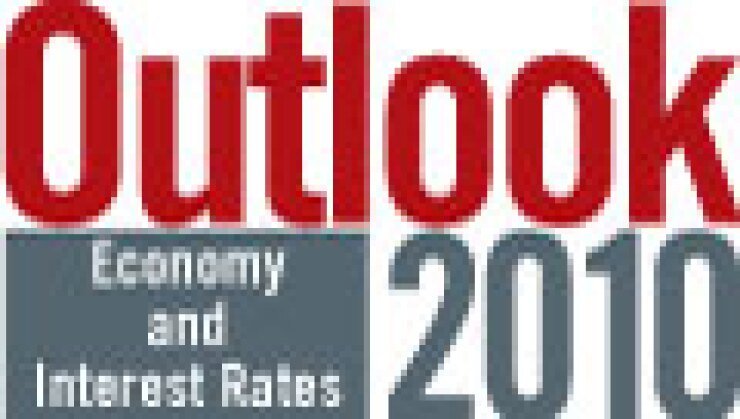
WASHINGTON — The economy will continue to grow next year, municipal bond yields will rise — though not as much as Treasury yields — and the threat of inflation will remain low, according to most economists and market participants.
But the unemployment rate will decline very slowly, too slowly to help state and local governments improve their fiscal conditions, they said.
Economists and market participants interviewed for their 2010 forecasts all agreed that the worst post-World War II recession ended by September at the latest, though the National Bureau of Economic Research may not announce it for another year.
As the economic recovery gains momentum, market participants said they expect municipal yields to increase next year, though competition from Build America Bonds will keep muni yields from increasing as much as Treasury yields.
The real gross domestic product is expected to grow at a 2.8% annual rate in 2010, according to the Securities Industry and Financial Markets Association's biannual economic outlook survey released almost two weeks ago.
The 20 economists who submitted estimates for the survey projected that the jobless rate will be above 10% next year, according to the median estimate.
The economists' expectations are in line with the Federal Reserve's economic outlook released in November. The Fed expects GDP to increase between 2.5% and 3.5% next year and for the unemployment rate to drop to between 9.3% and 9.7%.
"We are recovering from what happened, but we are not yet recovered," said Lakshman Achuthan, managing director of the Economic Cycle Research Institute, which forecasts the business cycle. Households initially lost $14 trillion in wealth during the recession as stock prices and home values declined, but have regained about $6 trillion during the recovery, he said.
Based on expected employment and GDP figures, "this ends up being a stronger recovery than last two recoveries at this stage," Achuthan said.
Not all economists are as positive. Paul Kasriel, chief economist at Northern Trust Corp., said that while many economists are revising their GDP forecasts upward for next year, growth in the first half of the year may not be as strong as they expect.
"I think we are in for a couple quarters in the first half that are weaker than what we are likely to see for the fourth quarter of this year," he said, while adding that he does not expect a "double-dip" recession.
None of the economists foresee economic contraction next year. The systemic threats that were still haunting the economy this time last year have dissipated, they said.
"The key sources of the recession were housing and the financial sector," said Robert DiClemente, senior US economist at Citi. "If those issues are resolved, then the double-dip argument does not have far to go. That downside is fading and there aren't problems on a scale that would overwhelm the entire economy. The problems that we have now are on the periphery."
EMPLOYMENT
The stubbornly high unemployment rate could dampen expectations.
"It is not going be the recovery people would like to see," said Robert B. MacIntosh, chief economist and muni portfolio manager for Eaton Vance Corp. "It is going to be a frustrating job environment."
Some economists closely tied their outlook on employment to their housing expectations. If housing prices have bottomed, then the entire food chain of employment for the housing sector, from construction workers to finance employees, will begin to expand, they said.
"Those who are still negative about the housing outlook believe there is more drag related to job recovery," said James Glassman, chief economist at JPMorgan Chase & Co. and chairman of the SIFMA economic advisory roundtable for 2009.
"The people who are more optimistic believe that the fundamental problem here was that the inflated conditions in the housing market were the dominant thing getting unwound," Glassman said.
According to DiClemente, "If you are optimistic on housing I think you have removed one of major the threats looming over the economy."
Achuthan said the employment recovery is already underway. "We do know as of the last jobs report that the non-manufacturing sector is already adding jobs," he said. "In the next few months we are going to see overall headline-jobs growth."
No one expects a snap-back employment recovery. And sources said that the best employment scenarios cannot salvage the tax revenue that continues to decline for many state and local governments.
"We believe that state revenues will continue to decline well after the economy begins to rebound," Standard & Poor's analysts wrote in a Dec. 16 report.
TREASURY YIELDS
As the economy improves, economists in the SIFMA survey said they expect the 10-year Treasury note yield to increase to 4.0% by December 2010. The yield was 3.47% on Dec. 18.
DiClemente said Treasury yields will be influenced by two factors next year: the business cycle's demand for credit and the premiums investors are going to demand for the risk of "uncontrollable deficits beyond the recovery."
The Fed's flow of funds data showed that private debt contracted in the third quarter as total demand for credit fell. This kept Treasury yields low because investors had no where else to go for higher returns.
"You have low [Treasury] rates because the Treasury has no competition," DiClemente said.
But once people begin to borrow more for cars, houses and business expansion, "then these budget deficits begin to loom," he said, and the budget deficits will "feed into the psychology of sustainability and swirling speculation of sovereign credit risk."
Higher interest rates also are expected to push yields higher next year. The SIFMA economists predict the Fed will begin to tighten the federal funds rate in the second half of 2010 and increase it to 0.5% next December, which would mean higher bond yields.
The Federal Open Market Committee is keeping the federal funds rate near zero percent, according to the statement it issued after its monetary policy meeting earlier this month.
INFLATION
The Fed should have leeway to keep interest rates low next year because inflation is not expected to force the issue. Inflation "will remain subdued for some time," the FOMC said.
The SIFMA economists expect core personal consumption expenditures — the Fed's preferred measure of inflation — to end 2010 at 1.1%. They expect the core consumer price index to be 1.3% next year, according to the median estimate.
Some sources cautioned against taking the inflation outlook too casually. Achuthan said the ECRI's future inflation gauge has reached a 12-month high following a 51-year low amid the recession.
"Deflation is off the table for now," he said. "We have simmering underlying inflation pressure. When we switch to surging [inflation] then the Fed's hand could get forced earlier than it wants."
Retail municipal bond investors may have a different view on inflation than the economists' consensus forecast, sources said.
"At the customer level, there is an ingrained thought there is inflation out there, which, right or wrong, is a fundamental question of how the market will move next year," said Todd Curtis, a muni portfolio manager with the Aquila Group of Funds in Phoenix. Next year's muni fund inflows could be half of the more than $77 billion record amount investors pumped into funds this year, he said.
Municipal yields are not expected to follow Treasury yields in lock-step, according to sources. Competition from BABs will suppress muni yields, they said, as issuers continue tap the program for the Treasury's direct payments equaling 35% of interest costs.
Tax-exempt munis are expected to command higher prices, as they have this year, because of the diminished supply. The 10-year triple-A muni scale yielded 3.07% on Dec. 18, below the 10-year average of 3.96%, according to Municipal Market Data. Yields have been below that average every week this year.
"As we come into next year, I do think we see muni rates moving up, but I don't think they are going to move as far as Treasury rates," said Mary Talbutt-Glassberg, vice president of fixed-income portfolio management at Davidson Trust Co.





